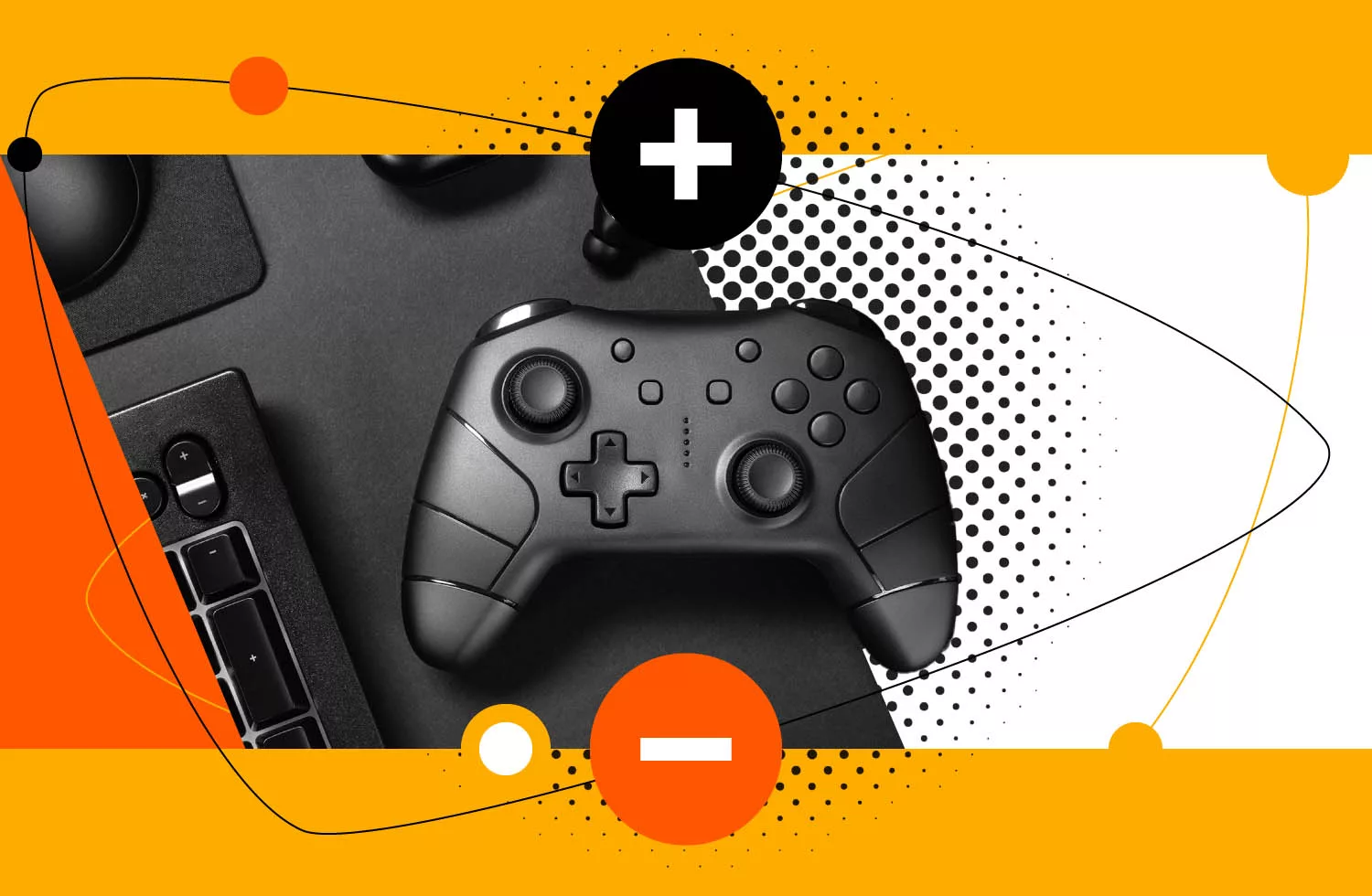
The video game market, valued at a staggering $217 billion in 2022 and projected to grow by 13.4% annually from 2023 to 2030, is undeniably a huge part of today’s culture. From epic PC battles to quick mobile quests, you can game anywhere, anytime — but the jury’s still out on whether hours grinding for that elusive legendary drop are helpful or harmful to your health.
Today, we’ll unpack the complex pros and cons of video games — from their documented cognitive and social benefits to the controversial concerns plaguing the industry.
Downsides of Video Games
Video games have faced a slew of criticisms since the invention of the first video game. Concerns range from behavioral and cognitive issues to risks of addiction and even harm to one’s physical well-being.
Can critics back up their claims with evidence? We dug around to find out.
Increased Risk of Aggression
Perhaps the most commonly cited concern with video games is an increased risk of aggression — and the question, “Do video games cause violence?” A link between violent video games and aggressive behavior has been a subject of extensive debate over the last few decades. Many current theories do suggest that exposure to violence in video games can desensitize individuals to real-world violence, but the conversation is complex.
On one hand, a study published in Frontiers in Psychology suggests that video game violence may be a risk factor for aggression. This is because violent video games can reinforce aggressive behavior and provide observational learning of aggressive models, similar to other violent media.
While this theory has some evidence to support it, it’s not the whole picture. Research in this area presents a complex and sometimes contradictory picture, as a different study by Czech researchers actually reached the opposite conclusion — that violent video games are not a direct cause of increased aggression.
The wide range of data available here suggests that the link between violent video games and aggression is complex, and no conclusive answer is really available on the subject right now.
Decreased Ability To Focus and Concentrate
Another common concern is that excessive video game play can contribute to poor sleep habits, which can negatively affect attention span, academic performance, and focus. This is a common concern for parents of gamers especially, as an inability to focus can impact every other aspect of a child’s life.
To address this issue, experts recommend setting limits on video game time for kids. “You should establish limits for kids, both in time spent gaming and the content,” writes child psychiatrist Dr. Sumru Bilge-Johnson of the Division of Pediatric Psychiatry and Psychology at Akron Children’s.
It’s worth noting that the recommendations for setting limits on screen time and prioritizing sleep apply to children and adults. Adults who engage in excessive video game play may also experience negative consequences related to sleep deprivation, such as decreased productivity, impaired cognitive function, and mood disturbances. With this in mind, limiting screen time can benefit individuals of all ages.
Possibility for Addiction
The World Health Organization (WHO) officially included “gaming disorder” in the 11th Revision of the International Classification of Diseases (ICD-11) in 2022, defining it as “A pattern of persistent or recurrent gaming behavior characterized by impaired control over gaming, increasing priority given to gaming over other interests and daily activities, and continuation or escalation of gaming despite the occurrence of negative consequences.”
Gaming disorder is an addiction and often involves prioritizing games over activities like work, school, and social interactions. Individuals find themselves unable to limit their playtime despite experiencing negative impacts on their lives — which can cause significant distress for themselves and others.
According to recent research, video game addiction impacts somewhere between 1.7% and 10% of the American population. This classification by WHO underscores the severity of gaming addiction, recognizing it as a genuine mental health concern.
Sometimes Leads to Escapism
Research published by Frontiers in Psychiatry suggests that escapism, defined as playing video games to avoid everyday problems and difficulties, is a significant motivation for many gamers. This may seem harmless in small quantities, but the danger of relying too heavily on video games for escape from stress, anxiety, or depression is real.
Relying on video games as a primary coping mechanism can lead to a cycle of avoidance, where individuals neglect addressing the underlying issues that contribute to their distress. Over time, this can result in a dependency on gaming as a form of emotional regulation, further exacerbating their problems and hindering their ability to develop healthy coping strategies.
Promotion of Gambling
The prevalence of loot boxes and in-game purchases in modern video games raises significant concerns about the promotion of gambling. In 2023, for example, Counter-Strike reportedly generated nearly $1 billion from loot boxes, which are essentially randomized rewards purchased with real money — a form of gambling. This unregulated system desensitizes players, especially children, to the risks of wagering real money on uncertain outcomes.
A 2024 report published by the U.K. Gambling Commission showed that most young people know they can buy in-game items with real money (68%) and open loot boxes (63%), and 27% have already done so. They also know they can bet with in-game items (37%). This widespread awareness illustrates the normalization of gambling behaviors in video games, especially in games marketed toward young people.
Poor Mental and Physical Health
Finally, prolonged video game use can lead to a range of physical health issues, according to a study by the University of Queensland. Researchers found that gaming continuously for three or more hours a day was associated with eye fatigue and pain in the wrist, hand, back, and neck. This was true across all age groups, from 18 to 94.
The cumulative effect of these physical health issues, if left unaddressed, can significantly impact an individual’s overall well-being. Chronic pain, sleep deprivation, and a sedentary lifestyle can lead to decreased productivity, social isolation, and even mental health problems over time.
Benefits of Video Games
While playing video games can have downsides when not managed correctly, it’s also an activity that offers a lot of surprising benefits. From increased cognitive skills to sharpened physical aptitudes, gaming may be more than just a leisure activity.
Improved Logic and Problem-Solving Skills
While video game benefits are many and varied, one of the most notable is improved logic and problem-solving skills. A 2022 study by the National Health Institute found that those who regularly played video games performed significantly better on cognitive skills and memory tests. This suggests that interactive gaming experiences can positively influence the cognitive development of young individuals.
While the classroom for this learning might be the nontraditional and treacherous landscape of The Lands Between or the constructive world of Minecraft, the cognitive ability gained by playing these games is equally applicable in the real world. For example, fighting challenging bosses in Elden Ring — with a carefully balanced character build — requires players to develop problem-solving skills, strategic thinking, and quick reflexes.
Similarly, in Minecraft, players must gather resources, build structures, and defend themselves against monsters, which encourages creativity, resource management, and planning. These problem-solving skills, honed in the virtual world, can be invaluable in real-life scenarios, whether it’s solving a complex problem at work, managing a household budget, or even navigating a new city.
Socialization and Teamwork
Video games can also be powerful tools for fostering social connection and teamwork. Contrary to the stereotype of the isolated gamer, many online games actually emphasize collaborative play, requiring players to communicate, strategize, and coordinate. A 2023 report by the Entertainment Software Association showed that a large majority of gamers report feeling less lonely or isolated after playing video games.
Beyond casual play, educational video games like Minecraft: Education Edition actively promote teamwork and problem-solving within a structured learning environment. Students collaborate on projects, learn to delegate tasks, and develop critical thinking skills while engaging in interactive gameplay. This exemplifies how video games can be intentionally designed to cultivate valuable social and collaborative abilities.
Make Faster and Better Decisions
Games that require quick reflexes and strategic thinking have been shown to enhance decision-making skills. A 2022 study showed that video game players were significantly faster and more accurate in their decisions than non-gamers. Players often face dynamic situations in games that demand rapid analysis and action, which increases their ability to process information quickly and make effective choices under pressure.
This decision-making capacity easily translates to the real world. For instance, a person who regularly plays action games could hypothetically have a faster reaction time when they encounter an obstacle on the road. Similarly, someone who enjoys choice-based RPGs may be able to weigh choices and make the most optimal decision in a tough situation over a non-gamer.
Better Hand-Eye Coordination
Video games, particularly those requiring precise movements and rapid reactions, can significantly improve hand-eye coordination. This benefit stems from the constant interplay between visual input and motor control demanded by many games. Players must simultaneously track on-screen elements and execute corresponding physical actions, such as aiming, jumping, or maneuvering, refining the connection between what they see and how they react.
This improved coordination isn’t limited to the gaming side of the virtual world, either. Surgeons, for example, often utilize virtual reality simulations to practice their skills for delicate procedures. This is a great example of how skills developed through gaming, such as fine motor control and spatial awareness, can directly translate to real-world tasks requiring precise hand movements.
Enhanced Cognitive Functions
Finally, video games that demand complex problem-solving and strategic thinking can significantly enhance overall cognitive functions. A 2024 study in the British Journal of Psychology revealed that regular gamers demonstrate enhanced performance in various cognitive tasks, including attention, memory, executive function, working memory, and visuospatial skills. These are substantial and wide-ranging benefits.
The cognitive demands of many video games contribute to these enhancements. For example, open-world games often require players to navigate complex environments, remember intricate storylines, and manage multiple objectives simultaneously. This constant mental engagement can easily translate to improved performance in academic, professional, and everyday tasks, where you must also balance a myriad of competing demands.
Explore, Learn, and Play
In the end, as we evaluate the many pros and cons of video games, it’s hard not to feel like gaming presents a double-edged sword. The best research available still presents both notable harm and notable advantages to those late-night competitive rank-climbing sessions. So, what is the discerning gamer to do?
For parents, the American Psychological Association addresses this complexity in children’s gaming habits by recommending supervision, tech literacy, and screen time limits. Adult gamers may find this advice helpful as well, but may also benefit from choosing to download games that don’t promote negative behaviors (like gambling or addiction) and integrate conveniently into their daily life.
Making informed choices and maintaining a balanced approach allows individuals to maximize the benefits of gaming while minimizing risks.











